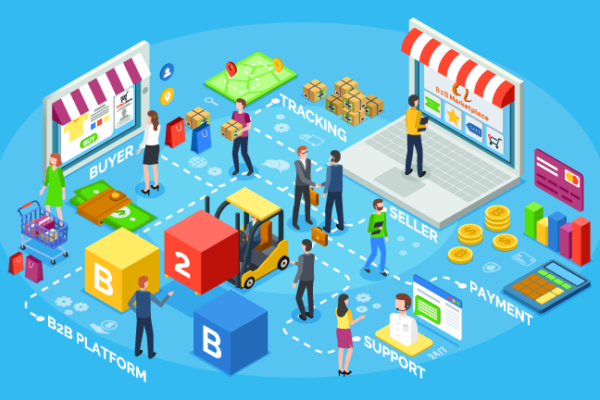Whether Direct or as a marketplace, both forms of B2B platforms have the same outcomes but the routes are different – along with the time and costs they involve.
In a B2B marketplace, companies sell their products alongside their competitors.
In a Direct B2B platform, a company creates a dedicated eCommerce portal for their products.
The Marketplace Twist to B2B
A B2B marketplace is an integrated space where buyers and sellers of many categories, sizes, regions, and experience-levels are organized in a digital model. Smart B2B marketplaces are designed with special attention, so searching for a trade-party becomes fast. And the next set of tasks also flow smoothly, whether it is pricing, contract setting, negotiations, or follow-up cycles. It has been estimated that the global B2B e-Commerce revenue for 2019 touched around $12 trillion. Do note how Asia-Pacific commands a market share of almost 80%.
A B2BecNews recent survey (that covered 110 business buyers from a diverse range of industries, from automotive and healthcare to food and beverage to consumer products) also revealed that 48.3% of firms are purchasing products online at least once per week, with 16% doing so multiple times each week. The survey says that most B2B buyers are shifting much of their corporate purchasing online. The 48.6% bucket, for instance, conducts 50% to 74% of all the corporate purchases online. This number includes those 23% companies as well that do at least 75% or more using B2B e-commerce. The shift is quite understandable. After all, these marketplaces allow buyers and suppliers, something that was never possible before.
B2B Marketplace – A Host of Benefits for Both Sides
B2B marketplaces enable superior customer service experience. This is especially useful for small brands that have not established sophisticated fulfillment processes.
A company doing business through a well-integrated B2B marketplace gains a lot compared to a Direct B2B platform.
- Instant visibility into a vast and global network of companies and products
- Precise and custom search
- Advertise easily in Classifieds and get the attention of the right buyers
- Ability to manage all trade-related transactions at one place
- Pricing transparency and buyer efficiency get considerably improved.
- Credibility checks – verified buyers and sellers
- Possibility of reaching out to global traders
- Packed with features for instant connections and interactions with interested parties
- Associated services to assist in other parts of trade – like legal help, contract advice, and logistics.
- The platform is optimized well to remove the complexities, heavy catalog burdens and delays that most direct platforms struggle with
- Better design and sleek functionalities to enable faster and simpler access to the right places
- Huge savings on travel time and sales expenses that can be invested in product development and customer experience
As you can see, B2B marketplaces go many levels up in connecting a company’s sales and marketing forces with prospects and customers, and vice versa. It makes the whole exercise a smooth two-way highway, which empowers not just sellers but buyers too. It is the way of doing business in the future. The instant, personalized, digital, and prompt benefits of B2C worlds are now available for B2B folks also.






